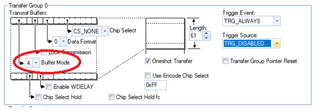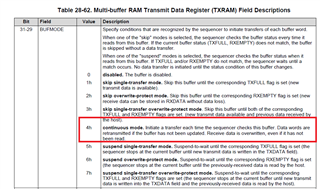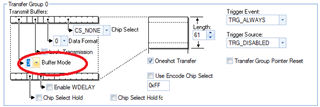Other Parts Discussed in Thread: HALCOGEN
Hi, I tried to implement a data exchange on MIBSPI1 by connecting the board's SIMO[0] MIBSPI1 line with the SOMI[0] MIBSPI1 port.
In Halcogen I selected these settings:



I want to transfer 10 FRAME of 61 ELEMENT each.
This is the implemented DMA and MIBSPI configuration:
void dmaConfigCtrlTxPacket(uint32 sadd,uint32 dadd,uint16 ElmntCnt, uint16 FrameCnt)
{
g_dmaCTRLPKT_TX.SADD = sadd; /* source address */
g_dmaCTRLPKT_TX.DADD = dadd; /* destination address */
g_dmaCTRLPKT_TX.CHCTRL = 0; /* channel control */
g_dmaCTRLPKT_TX.FRCNT = FrameCnt; /* frame count */
g_dmaCTRLPKT_TX.ELCNT = ElmntCnt; /* element count */
g_dmaCTRLPKT_TX.ELDOFFSET = 4; /* element destination offset */
g_dmaCTRLPKT_TX.ELSOFFSET = 0; /* element source offset */
g_dmaCTRLPKT_TX.FRDOFFSET = 0; /* frame destination offset */
g_dmaCTRLPKT_TX.FRSOFFSET = 0; /* frame destination offset */
g_dmaCTRLPKT_TX.PORTASGN = 4; /* port b */
g_dmaCTRLPKT_TX.RDSIZE = ACCESS_16_BIT; /* read size */
g_dmaCTRLPKT_TX.WRSIZE = ACCESS_16_BIT; /* write size */
g_dmaCTRLPKT_TX.TTYPE = FRAME_TRANSFER ; /* transfer type */
g_dmaCTRLPKT_TX.ADDMODERD = ADDR_INC1; /* address mode read */
g_dmaCTRLPKT_TX.ADDMODEWR = ADDR_OFFSET; /* address mode write */
g_dmaCTRLPKT_TX.AUTOINIT = AUTOINIT_ON; /* autoinit */
}
void dmaConfigCtrlRxPacket(uint32 sadd,uint32 dadd,uint16 ElmntCnt, uint16 FrameCnt)
{
g_dmaCTRLPKT_RX.SADD = sadd; /* source address */
g_dmaCTRLPKT_RX.DADD = dadd; /* destination address */
g_dmaCTRLPKT_RX.CHCTRL = 0; /* channel control */
g_dmaCTRLPKT_RX.FRCNT = FrameCnt; /* frame count */
g_dmaCTRLPKT_RX.ELCNT = ElmntCnt; /* element count */
g_dmaCTRLPKT_RX.ELDOFFSET = 0; /* element destination offset */
g_dmaCTRLPKT_RX.ELSOFFSET = 4; /* element source offset */
g_dmaCTRLPKT_RX.FRDOFFSET = 0; /* frame destination offset */
g_dmaCTRLPKT_RX.FRSOFFSET = 0; /* frame destination offset */
g_dmaCTRLPKT_RX.PORTASGN = 4; /* port b */
g_dmaCTRLPKT_RX.RDSIZE = ACCESS_16_BIT; /* read size */
g_dmaCTRLPKT_RX.WRSIZE = ACCESS_16_BIT; /* write size */
g_dmaCTRLPKT_RX.TTYPE = FRAME_TRANSFER ; /* transfer type */
g_dmaCTRLPKT_RX.ADDMODERD = ADDR_OFFSET; /* address mode read */
g_dmaCTRLPKT_RX.ADDMODEWR = ADDR_INC1; /* address mode write */
g_dmaCTRLPKT_RX.AUTOINIT = AUTOINIT_ON; /* autoinit */
}
void mibspiDmaConfig(mibspiBASE_t *mibspi,uint32 channel, uint32 txchannel, uint32 rxchannel)
{
uint32 bufid = E_COUNT - 1; //number of buffers in TG0
/* setting transmit and receive channels */
mibspi->DMACTRL[channel] |= (rxchannel << 20) | (txchannel << 16);
if (F_COUNT > 1) {
mibspi->TGCTRL[channel] &= 0xBFFFFFFF; // Disable ONESHOT
} else {
mibspi->TGCTRL[channel] |= 0x40000000; // Enable ONESHOT
}
/* enabling transmit and receive dma */
mibspi->DMACTRL[channel] |= 0x8000C000;
/* setting Initial Count of DMA transfers and the buffer utilized for DMA transfer */
mibspi->DMACTRL[channel] |= (bufid<<24);
/* setting Initial Count of DMA transfers and the buffer utilized for DMA transfer */
mibspi->DMACTRL[channel] |= ((F_COUNT - 1)<<8);
// /* setting Initial Count of DMA transfers and the buffer utilized for DMA transfer */
// mibspi->DMACTRL[channel] |= (0<<31);
//
// mibspi->DMACNTLEN = 0x1;
// mibspi->DMACOUNT[channel] = (F_COUNT - 1) << 16;
}
If I start the program the transfer occurs correctly, but with the oscilloscope, I see that the clock and MOSI lines continue to send data despite the fact that the transmission should be finished since I receive the block transfer complete interrupt. Is this behavior normal or is there something wrong with the configuration or implementation?
Attached is the complete sys_main.c for further analysis.
/** @file sys_main.c
* @brief Application main file
* @date 11-Dec-2018
* @version 04.07.01
*
* This file contains an empty main function,
* which can be used for the application.
*/
/*
* Copyright (C) 2009-2018 Texas Instruments Incorporated - www.ti.com
*
*
* Redistribution and use in source and binary forms, with or without
* modification, are permitted provided that the following conditions
* are met:
*
* Redistributions of source code must retain the above copyright
* notice, this list of conditions and the following disclaimer.
*
* Redistributions in binary form must reproduce the above copyright
* notice, this list of conditions and the following disclaimer in the
* documentation and/or other materials provided with the
* distribution.
*
* Neither the name of Texas Instruments Incorporated nor the names of
* its contributors may be used to endorse or promote products derived
* from this software without specific prior written permission.
*
* THIS SOFTWARE IS PROVIDED BY THE COPYRIGHT HOLDERS AND CONTRIBUTORS
* "AS IS" AND ANY EXPRESS OR IMPLIED WARRANTIES, INCLUDING, BUT NOT
* LIMITED TO, THE IMPLIED WARRANTIES OF MERCHANTABILITY AND FITNESS FOR
* A PARTICULAR PURPOSE ARE DISCLAIMED. IN NO EVENT SHALL THE COPYRIGHT
* OWNER OR CONTRIBUTORS BE LIABLE FOR ANY DIRECT, INDIRECT, INCIDENTAL,
* SPECIAL, EXEMPLARY, OR CONSEQUENTIAL DAMAGES (INCLUDING, BUT NOT
* LIMITED TO, PROCUREMENT OF SUBSTITUTE GOODS OR SERVICES; LOSS OF USE,
* DATA, OR PROFITS; OR BUSINESS INTERRUPTION) HOWEVER CAUSED AND ON ANY
* THEORY OF LIABILITY, WHETHER IN CONTRACT, STRICT LIABILITY, OR TORT
* (INCLUDING NEGLIGENCE OR OTHERWISE) ARISING IN ANY WAY OUT OF THE USE
* OF THIS SOFTWARE, EVEN IF ADVISED OF THE POSSIBILITY OF SUCH DAMAGE.
*
*/
/* USER CODE BEGIN (0) */
/* USER CODE END */
/* Include Files */
#include "sys_common.h"
/* USER CODE BEGIN (1) */
#include "mibspi.h"
#include "sys_dma.h"
#include "stdio.h"
#include "sys_core.h"
/* USER CODE END */
/** @fn void main(void)
* @brief Application main function
* @note This function is empty by default.
*
* This function is called after startup.
* The user can use this function to implement the application.
*/
/* USER CODE BEGIN (2) */
void mibspiDmaConfig(mibspiBASE_t *mibspi,uint32 channel, uint32 txchannel, uint32 rxchannel);
void dmaConfigCtrlRxPacket(uint32 sadd,uint32 dadd,uint16 ElmntCnt, uint16 FrameCnt);
void dmaConfigCtrlTxPacket(uint32 sadd,uint32 dadd,uint16 ElmntCnt, uint16 FrameCnt);
void loadDataPattern1(uint32 psize, uint16* pptr);
void loadDataPattern2(uint32 psize, uint16* pptr);
#define E_COUNT 61 //4 /*Element count*/
#define F_COUNT 10 //2 /*Frame count*/
#define D_SIZE E_COUNT * F_COUNT
/* SPI1 transmit buffer in sys ram */
uint16 mibSPI1_TX_Data[D_SIZE];//= "$GPZDA,hhmmss.ss,dd,mm,yyyy,aa,bb*CS<CR><LF>$GPGLL,llll.lllll,a,yyyyy.yyyyy,b,hhmmss.ss,c,a*CS<CR><LF>$GPGSV,t,n,xx,aa,ee,zzz,cc,aa,ee,zzz,cc,aa,ee,zzz,cc,aa,ee,zzz,cc*CS<CR><LF>$GPRMC,hhmmss.ss,A,llll.lllll,A,yyyyy.yyyyy,B,ssss.ss,hhh.hh,ddmmyy,mm.m,D,B*CS<CR><LF>$GPGGA,hhmmss.ss,llll.lllll,A,yyyyy.yyyyy,B,q,nn,hh.h,aaaaa.a,M,sss.s,M,a.a,aaaa*CS<CR><LF>$GPGSA,a,m,s1,s2,s3,s4,s5,s6,s7,s8,s9,s10,s11,s12,pp.p,hh.h,vv.v*CS<CR><LF>$GPVTG,ddd.dd,T,ddd.dd,M,ssss.ss,N,ssss.ss,K,a*CS<CR><LF>";
/* SPI2 transmit buffer in sys ram */
/* SPI1 receive buffer in sys ram */
uint16 mibSPI1_RX_Data[D_SIZE]= {0};
/* SPI2 receive buffer in sys ram */
g_dmaCTRL g_dmaCTRLPKT_RX; /* dma control packet configuration stack for receive */
g_dmaCTRL g_dmaCTRLPKT_TX; /* dma control packet configuration stack for transmit */
typedef enum dmaRequest
{
DMA_REQ0 = 0U, DMA_REQ1, DMA_REQ2, DMA_REQ3,
DMA_REQ4, DMA_REQ5, DMA_REQ6, DMA_REQ7,
DMA_REQ8, DMA_REQ9, DMA_REQ10, DMA_REQ11,
DMA_REQ12, DMA_REQ13, DMA_REQ14, DMA_REQ15,
DMA_REQ16, DMA_REQ17, DMA_REQ18, DMA_REQ19,
DMA_REQ20, DMA_REQ21, DMA_REQ22, DMA_REQ23,
DMA_REQ24, DMA_REQ25, DMA_REQ26, DMA_REQ27,
DMA_REQ28, DMA_REQ29, DMA_REQ30, DMA_REQ31,
DMA_REQ32, DMA_REQ33, DMA_REQ34, DMA_REQ35,
DMA_REQ36, DMA_REQ37, DMA_REQ38, DMA_REQ39,
DMA_REQ40, DMA_REQ41, DMA_REQ42, DMA_REQ43,
DMA_REQ44, DMA_REQ45, DMA_REQ46, DMA_REQ47
}dmaRequest_t;
unsigned MIBSPI_DMA_FLG;
/* USER CODE END */
int main(void)
{
/* USER CODE BEGIN (3) */
uint32 i;
_enable_interrupt_();
/* - initializing mibspi - enabling Transfer Group 0 , length 128 (halcogen file)*/
mibspiInit();
dmaDisable();
loadDataPattern1(D_SIZE, &mibSPI1_TX_Data[0]);
/*****************************************************************/
/* - configuring dma control packet for sending data to mibSPI3 tx buffer*/
dmaConfigCtrlRxPacket((uint32)&(mibspiRAM1->rx[0].data),(uint32)&(mibSPI1_RX_Data), E_COUNT, F_COUNT);
/* - configuring dma control packet for receiving data from mibSPI3 rx buffer*/
dmaConfigCtrlTxPacket((uint32)&(mibSPI1_TX_Data),(uint32)&(mibspiRAM1->tx[0].data), E_COUNT, F_COUNT);
/* - setting dma control packets for transmit */
dmaSetCtrlPacket(DMA_CH1, g_dmaCTRLPKT_TX);
/* - setting dma control packets for Receive */
dmaSetCtrlPacket(DMA_CH0, g_dmaCTRLPKT_RX);
/* DMA Request Sources: MIBSPI1[0] -> DMA request 1 */
dmaReqAssign(DMA_CH1, DMA_REQ9 ); /* Transmit data DMA channel enable. Request line=0*/
/* DMA Request Sources: MIBSPI1[1] -> DMA request 0 */
dmaReqAssign(DMA_CH0, DMA_REQ8 ); /* Receive data DMA channel enable. Request Line=1. */
/* - setting the dma channel to trigger on h/w request */
dmaSetChEnable(DMA_CH1, DMA_HW);
dmaSetChEnable(DMA_CH0, DMA_HW);
/* - configuring the mibspi dma , channel 0 , tx line -0 , rxline -1 */
/* - refer to the device data sheet dma request source for mibspi tx/rx */
mibspiDmaConfig(mibspiREG1, 0, 5, 4);
/* Enable Block Transfer Complete interrupt for the receive after transfer complete */
dmaEnableInterrupt(DMA_CH0, BTC); //MibSPI1 RX
/****************************************************************/
/****************************************/
/* enable DMA now to make sure it's ready to take requests */
dmaEnable();
// mibspiSetData(mibspiREG1, 0, &mibSPI1_TX_Data[0]);
// mibspiSetData(mibspiREG3, 0, &mibSPI3_TX_Data[0]);
for(i=0;i<=20;i++){printf("\n%dA",i);}
mibspiTransfer(mibspiREG1, 0);
while(MIBSPI_DMA_FLG == 0);
for(i=0;i<=D_SIZE;i++)
{
printf("\r\n%d mibSPI1_TX_Data: 0x%04x mibSPI1_RX_Data: 0x%04x ",i, mibSPI1_TX_Data[i], mibSPI1_RX_Data[i]);
}
while(1);
/* USER CODE END */
return 0;
}
/* USER CODE BEGIN (4) */
void dmaGroupANotification(dmaInterrupt_t inttype, uint32 channel)
{
MIBSPI_DMA_FLG = 1;
}
void dmaConfigCtrlTxPacket(uint32 sadd,uint32 dadd,uint16 ElmntCnt, uint16 FrameCnt)
{
g_dmaCTRLPKT_TX.SADD = sadd; /* source address */
g_dmaCTRLPKT_TX.DADD = dadd; /* destination address */
g_dmaCTRLPKT_TX.CHCTRL = 0; /* channel control */
g_dmaCTRLPKT_TX.FRCNT = FrameCnt; /* frame count */
g_dmaCTRLPKT_TX.ELCNT = ElmntCnt; /* element count */
g_dmaCTRLPKT_TX.ELDOFFSET = 4; /* element destination offset */
g_dmaCTRLPKT_TX.ELSOFFSET = 0; /* element source offset */
g_dmaCTRLPKT_TX.FRDOFFSET = 0; /* frame destination offset */
g_dmaCTRLPKT_TX.FRSOFFSET = 0; /* frame destination offset */
g_dmaCTRLPKT_TX.PORTASGN = 4; /* port b */
g_dmaCTRLPKT_TX.RDSIZE = ACCESS_16_BIT; /* read size */
g_dmaCTRLPKT_TX.WRSIZE = ACCESS_16_BIT; /* write size */
g_dmaCTRLPKT_TX.TTYPE = FRAME_TRANSFER ; /* transfer type */
g_dmaCTRLPKT_TX.ADDMODERD = ADDR_INC1; /* address mode read */
g_dmaCTRLPKT_TX.ADDMODEWR = ADDR_OFFSET; /* address mode write */
g_dmaCTRLPKT_TX.AUTOINIT = AUTOINIT_ON; /* autoinit */
}
void dmaConfigCtrlRxPacket(uint32 sadd,uint32 dadd,uint16 ElmntCnt, uint16 FrameCnt)
{
g_dmaCTRLPKT_RX.SADD = sadd; /* source address */
g_dmaCTRLPKT_RX.DADD = dadd; /* destination address */
g_dmaCTRLPKT_RX.CHCTRL = 0; /* channel control */
g_dmaCTRLPKT_RX.FRCNT = FrameCnt; /* frame count */
g_dmaCTRLPKT_RX.ELCNT = ElmntCnt; /* element count */
g_dmaCTRLPKT_RX.ELDOFFSET = 0; /* element destination offset */
g_dmaCTRLPKT_RX.ELSOFFSET = 4; /* element source offset */
g_dmaCTRLPKT_RX.FRDOFFSET = 0; /* frame destination offset */
g_dmaCTRLPKT_RX.FRSOFFSET = 0; /* frame destination offset */
g_dmaCTRLPKT_RX.PORTASGN = 4; /* port b */
g_dmaCTRLPKT_RX.RDSIZE = ACCESS_16_BIT; /* read size */
g_dmaCTRLPKT_RX.WRSIZE = ACCESS_16_BIT; /* write size */
g_dmaCTRLPKT_RX.TTYPE = FRAME_TRANSFER ; /* transfer type */
g_dmaCTRLPKT_RX.ADDMODERD = ADDR_OFFSET; /* address mode read */
g_dmaCTRLPKT_RX.ADDMODEWR = ADDR_INC1; /* address mode write */
g_dmaCTRLPKT_RX.AUTOINIT = AUTOINIT_ON; /* autoinit */
}
void mibspiDmaConfig(mibspiBASE_t *mibspi,uint32 channel, uint32 txchannel, uint32 rxchannel)
{
uint32 bufid = E_COUNT - 1; //number of buffers in TG0
/* setting transmit and receive channels */
mibspi->DMACTRL[channel] |= (rxchannel << 20) | (txchannel << 16);
if (F_COUNT > 1) {
mibspi->TGCTRL[channel] &= 0xBFFFFFFF; // Disable ONESHOT
} else {
mibspi->TGCTRL[channel] |= 0x40000000; // Enable ONESHOT
}
/* enabling transmit and receive dma */
mibspi->DMACTRL[channel] |= 0x8000C000;
/* setting Initial Count of DMA transfers and the buffer utilized for DMA transfer */
mibspi->DMACTRL[channel] |= (bufid<<24);
/* setting Initial Count of DMA transfers and the buffer utilized for DMA transfer */
mibspi->DMACTRL[channel] |= ((F_COUNT - 1)<<8);
// /* setting Initial Count of DMA transfers and the buffer utilized for DMA transfer */
// mibspi->DMACTRL[channel] |= (0<<31);
//
// mibspi->DMACNTLEN = 0x1;
// mibspi->DMACOUNT[channel] = (F_COUNT - 1) << 16;
}
void loadDataPattern1(uint32 psize, uint16* pptr)
{
int i;
for(i=0;i<psize;i++)
{
pptr[i] = i;
}
}
void loadDataPattern2(uint32 psize, uint16* pptr)
{
int i;
int j = 0;
for(i=psize;i>0;i--)
{
pptr[j] = i;
j++;
}
}
/* USER CODE END */
Thank you in advance for your help.




